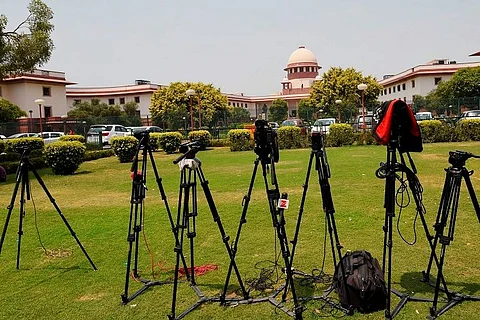

On November 20, Caravan published a report on the death of CBI court judge Brijgopal Harkishan Loya in a suspicious manner in Nagpur in 2014.
Loya was at the time hearing a high-profile case relating to the alleged staged encounter of Sohrabuddin Sheikh in 2005. BJP national president Amit Shah, who was then the Gujarat Home Minister, was the prime accused in the case.
Less than a month after Loya's death, a CBI court discharged Shah from the case observing that the charges were politically motivated.
The report by Niranjan Takle, which takes into account interviews with Loya's relatives, points out several explosive details along with raising unanswered questions surrounding the death of the judge, the cause of which was earlier reported to be a heart attack.
The story immediately went viral with many demanding that a SIT be set up to probe Loya's death.
Given the chilling nature of the allegations and the political ramifications it could have, it was not hard to miss the silence that the mainstream English media has maintained over the developments. On the other hand, the story has been picked up by several regional channels and publications.
Vinod K Jose, Executive Editor of The Caravan Magazine, in a scathing Facebook post on Wednesday, condemned the "English press and urbanite intellectuals" for maintaining a deafening silence over the issue.
"When English press and urbanite intellectuals shy away, language press, just like the time of the British, shows much more boldness. Mathrubhumi, with histories intertwining with freedom movement, and sells today 1.5 million copies has the story on the front page. Then for Deshabhimani and Madhyamam it is really the biggest news. And Manorama covered it yesterday and today. Kannada, Tamil too followed. Gujarati I hear one did. But the quietness of the English and the Hindi press makes us worry for India," he wrote.
His sentiment has been echoed by many on social media with users questioning the media's integrity. Many mentioned how the media latched on to the Kangana-Hrithik controversy, but has not spoken a word about something as critical as the death of a judge presiding over a case involving the BJP party chief.
The explosive news about the mysterious manner of Judge Loya's death & the deafaning silence of the Lutyens Media is a sad commentary on whats wrong with our press~COMPROMISED https://t.co/RH7x6yGkKS
— arvind. (@arvindbanta) November 22, 2017
We need to talk about big media's incredible studied silence on the disturbing questions that have been raised regarding judge Loya's death. @ndtv @CNNnews18 @republic @IndianExpress @htTweets https://t.co/PeAoHD32Sm
— Puja Sen (@psen9) November 22, 2017
Based on coverage of @thecaravanindia's story, it seems that two deaths need to be investigated: that of Judge Loya, and that of the Indian media. The first is a political shocker, the latter a national tragedy.
— Mitali Saran (@mitalisaran) November 22, 2017
Is it fear of #AmitShah which has stopped the mainstream media from picking up @thecaravanindia's investigation into CBI judge #Loya's death under very suspicious circumstances?
— ranjona banerji (@ranjona) November 22, 2017
Or just the prevailing sycophancy in general?
Judge Loya has put our media’s integrity on test.
— SonaliRanade (@sonaliranade) November 22, 2017
Niranjan Takle spoke to some of the family members of Loya, including his sisters and father, for the report. Their accounts raise several inconsistencies in the version of Loya's death that was presented to the family in 2014.
For instance, the timing of his death, and presence of bloodstains on his clothes, his post-mortem report and data being removed from his cellphone before it was returned to the family.
One of Loya's sisters told the reporter that an RSS worker called Ishwar Baheti had called and informed their father that he would arrange for the body to be sent to their house on Gategaon.
"Nobody knows why, how and when he came to know about the death of Brij Loya," she told Niranjan.
The Caravan's story comes a month after The Wire published a report claiming that the revenues of Jay Shah's (Amit Shah's son) company had risen 16,000 times from Rs 50,000 to Rs 80 crore within a year after Narendra Modi became the Prime Minister in 2014.
Soon after, Jay Shah filed a criminal defamation case against Rohini Singh, the author of the story, Founding Editors Siddharth Vardarajan and MK Venu, and owner of The Wire, Federation for Independent Journalists (FIJ).